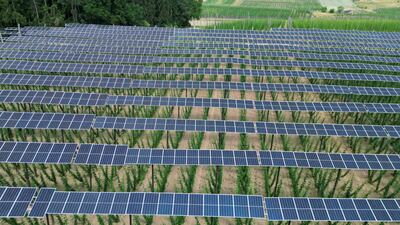Renewable energy was a cheaper source of electricity last year than fossil fuels, the International Renewable Energy Agency has said.
About 86 per cent of all the newly commissioned renewable capacity in 2022 was less expensive than power generated from fossil fuels, the Abu Dhabi-based agency said in a report on Tuesday.
New renewable energy capacity added since 2000 reduced electricity sector fuel costs by $520 billion last year, the report said.
In non-Organisation for Economic Co-operation and Development countries, the agency said new capacity additions in 2022 will result in lifetime savings of up to $580 billion.
“Irena sees 2022 as a veritable turning point in the deployment for renewables as its cost-competitiveness has never been greater despite the lingering commodity and equipment cost inflation around the world,” said Francesco La Camera, the agency's director general.
“The most affected regions by the historic price shock were remarkably resilient, largely thanks to the massive increase of solar and wind in the last decade.”
Solar energy generation is on course to meet net-zero emissions targets by 2050, according to the International Energy Agency.
Solar photovoltaic generation surged by a record 270 terawatt hours last year to 1,300 terawatt hours, surpassing wind for the first time, the Paris-based agency said.
Direct cost savings, as well as curbing carbon dioxide emissions and local pollutants will yield substantial economic benefits, Irena said.
“Without the deployment of renewables over the last two decades, the economic disruption from the fossil fuel price shock in 2022 would have been much worse and, possibly, beyond many governments' ability to soften with public funding,” the agency said.
Inflation in commodity and equipment costs resulted in countries experiencing different cost trends last year.
At a global level, the weighted average cost of electricity fell by 3 per cent for utility-scale solar PV in 2022. It dropped by 5 per cent for onshore wind and by 22 per cent for geothermal, Irena said.
However, the costs for offshore wind and hydroelectric power increased by 2 per cent and 18 per cent, respectively.
“For the last 13 to 15 years, renewable power generation costs from solar and wind power have been falling,” the agency said.
“Between 2010 and 2022, solar and wind power became cost-competitive with fossil fuels even without financial support.”
“[The] expected high fossil fuel prices will cement the structural shift that has seen renewable power generation become the least cost source of new generation, even undercutting existing fossil fuel generators,” Irena said.
“Renewables can protect consumers from fossil fuel price shocks, avoid physical supply shortages and enhance energy security.”
Annual renewable power capacity must add an average of 1,000 gigawatts annually by 2030 to meet the goals of the Paris Agreement, the agency said in a report in June.
At the same time, global investments in energy transition technology must quadruple to $35 trillion, Irena said.
Last month, the agency said the supply of critical minerals used in electric vehicles and renewable energy projects was vulnerable to a range of geopolitical risks, and that the disruptions could affect the speed of the energy transition in the “short to medium term”.






